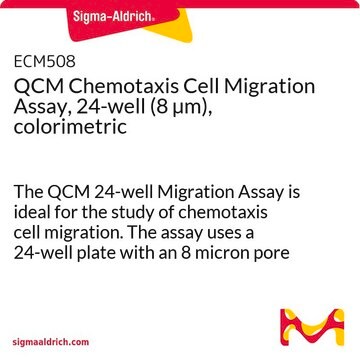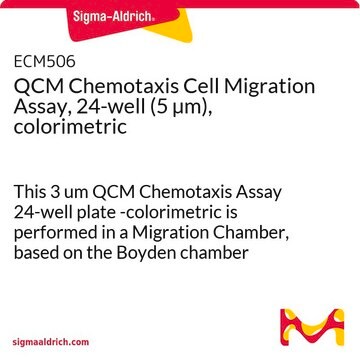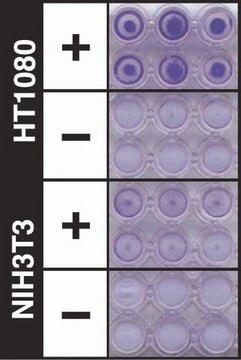ECM200
QCM 3 µm Endothelial Cell Migration Assay Fibronectin, Colorimetric
Synonym(s):
Endothelial migration assay
About This Item
Recommended Products
manufacturer/tradename
Chemicon®
QCM
Quality Level
technique(s)
cell based assay: suitable
detection method
colorimetric
fluorometric
shipped in
wet ice
General description
Introduction
Angiogenesis is a fundamental process involving the growth of new blood vessels from pre-existing vessels. It is important in development and wound healing, as well as pathologic diseases such as diabetic retinopathy and cancer. During angiogenesis, endothelial cells need to move out of existing vessels, migrate into new areas, proliferate and assemble into new capillaries. The migration of endothelial cells is regulated by many angiogenic factors and anti-angiogenic factors. It is critical for researchers to understand the mechanisms of endothelial cell migration.
Millipore′s 3 μm QCM Endothelial Cell Migration Assay – Fibronectin, Colorimetric provides a quick and efficient system to study the ability of compounds to induce or inhibit endothelial cell migration. This assay also allows screening of pharmacological agents, evaluation of integrins or other adhesion receptors responsible for endothelial cell migration, analysis of gene function in transfected cells, and determination of ECM protein involvement in cell movement.
This versatile assay permits counting of individual migratory cells, and, more importantly, allows quantitative analysis by optical density (OD) using a standard microplate reader. This convenient assay allows large scale screening and quantitative comparison of multiple samples and includes individual migration controls for each sample.
Application
Each kit provides sufficient materials for the evaluation of 12 samples.
Packaging
Components
2. BSA Control Plate: One 24-well culture plate, containing 12 BSA-coated Boyden chambers, sufficient for the evaluation of 12 controls.
3. Cell Stain Solution: One vial - 10 mL
4. Extraction Buffer: One vial - 10 mL
5. 24-Well Stain Extraction Plate
6. 96-Well Stain Quantitation Plate
7. Swabs: 50 ea
8. Forceps: 1 pair
Storage and Stability
Legal Information
Disclaimer
Signal Word
Danger
Hazard Statements
Precautionary Statements
Hazard Classifications
Eye Irrit. 2 - Flam. Liq. 2
Storage Class Code
3 - Flammable liquids
WGK
WGK 3
Regulatory Listings
Regulatory Listings are mainly provided for chemical products. Only limited information can be provided here for non-chemical products. No entry means none of the components are listed. It is the user’s obligation to ensure the safe and legal use of the product.
PDSCL
Please refer to KIT Component information
PRTR
Please refer to KIT Component information
FSL
Please refer to KIT Component information
ISHL Indicated Name
Please refer to KIT Component information
ISHL Notified Names
Please refer to KIT Component information
Cartagena Act
Please refer to KIT Component information
JAN Code
キットコンポーネントの情報を参照してください
Certificates of Analysis (COA)
Search for Certificates of Analysis (COA) by entering the products Lot/Batch Number. Lot and Batch Numbers can be found on a product’s label following the words ‘Lot’ or ‘Batch’.
Already Own This Product?
Find documentation for the products that you have recently purchased in the Document Library.
Customers Also Viewed
Articles
Cell based angiogenesis assays to analyze new blood vessel formation for applications of cancer research, tissue regeneration and vascular biology.
Our team of scientists has experience in all areas of research including Life Science, Material Science, Chemical Synthesis, Chromatography, Analytical and many others.
Contact Technical Service












